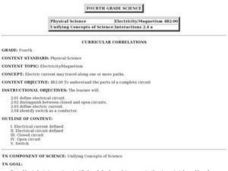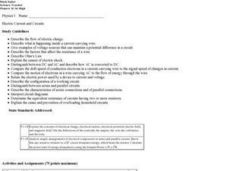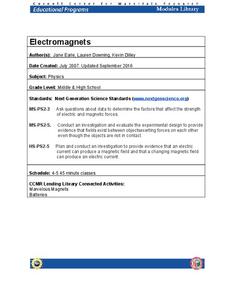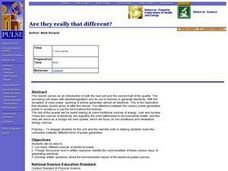Curated OER
Paths of Electrical Currents
Fourth graders examine the paths that electrical currents travel. They create a current of electricity using flashlights, bulbs, batteries, wires and tape. They determine how to create a closed circuit that will light the bulb. They...
Curated OER
Electricity and Magnets
In this physics review worksheet, learners compare average and instantaneous speed, review Newton's laws, electricity, and magnets. This worksheet has 12 fill in the blank, 8 short answer questions, and 6 problems to solve.
Curated OER
Solar Cells
Students are able to answer basic questions about the process of turning light energy into electrical energy. They are introduced to the basic physics and chemistry behind the operation of a solar cell. Students explore how a single...
Curated OER
TE Activity: Yogurt Cup Speakers
Sixth graders build a speaker as they investigate the roles of electricity and magnetism. They discover the properties of magnets, create an electromagnet, and determine the direction of a magnetic field. They show cause and effect...
Curated OER
Chemical Bonding
Students classify compounds as ionic or covalent. For this chemical bonding lesson plan, students experiment with 6 chemical compounds. They test physical properties such as the melting point, the solubility and the electrical...
Curated OER
Opposites Attract
Students demonstrate the attraction of small pieces of paper to a charged plastic rod and conduct experiment with other objects to determine whether they can hold a charge. They then use online applets to apply their experiments to...
Curated OER
Electric Current and Circuits
Compare the drift speed of conduction electrons in a current-carrying wire to the signal speed of changes in current. They also distinguish between DC and AC and describe how AC is converted to DC.
K12 Reader
Waves & Currents
Challenge your young readers with a passage about physical science. After reading about sound waves and electric currents, kids answer five reading comprehension questions about what they have read.
Cornell University
Electromagnets
Discover the connection between electric current and magnets. Scholars create electromagnets by passing a magnet through a coil. They experiment with different materials to determine the variables that affect the strength of the current.
Curated OER
Top Quark Lab
Students find the mass of the top quark. In this physics lesson, students create a vector diagram from a given set of data. They discuss their calculations and findings in class.
Curated OER
Charge It!
Learners complete an experiment using balloons to help them examine the concept of static electricity. They discover how engineers use this information to create better air filters for homes. They describe how to charge an insulator as...
Curated OER
Nuclear Reactions - Rutherford's Alpha Scattering Experiment
Neat! Show your physics class exactly how Ernest Rutherford fired alpha particles at a piece of gold foil and so determined that most of an atom is composed of empty space. Not just a slide show, but almost an animation, this...
Curated OER
Electrical Current
Students describe an electrical current and the factors that determine the resistance of an object. For this electrical current lesson students discuss their knowledge of voltage, current and resistance.
Curated OER
Electric Gelatin
Students complete an experiment about static electricity. They are provided with a small plate that has gelatin and then given a small balloon. Students put the balloon above the gelatin and observe what happens, and then slowly raise...
Curated OER
Magnetic Field
Students explore how compass and Gauss meter detect a magnetic field. In this physics lesson, students build their own Gauss meter and sensor based on given procedure. They cite real world applications of magnetism.
Curated OER
Homopolar Motor Experiments
Students construct a homopolar motor following certain procedures. In this physics lesson, students explain how generators and motors work. They compare and contrast the characteristics of both.
PHET
Capacitor Lab
The first capacitor was a Leyden jar, invented in 1745. Physics scholars explore capacitors in an engaging simulation. They may view one or set up circuits which contain two to three either in series or parallel. Other views include...
Curated OER
Science Crossword Puzzle
Class members read 25 clues about all areas of science, including biology, chemistry, weather, physical science, and insert their answers into a crossword puzzle. There is no word bank and the students would need experience with tough...
Curated OER
Water and Ice
Students examine water. For this chemistry lesson, student examine the physical properties of water and how it changes from a liquid to a solid or a gas. This lesson contains links to a second and third complimentary lesson on...
Curated OER
Science: Generating Electricity
Eighth graders examine the various methods of generating electricity and explain their commonalities. They determine what is the most common source of energy and what are the potential environmental health hazards due to electrical...
Curated OER
Battery Charger
Students explain how battery chargers work. In this physics lesson plan, students discuss the two main ways that vehicles get charged. They build their own battery charger.
Curated OER
Electromagnets
High schoolers conduct a series of experiments on electromagnets. In this physics lesson, students build their own electromagnet and explain how it works. They determine the factors that affect its strength.
Curated OER
The Invention of Faraday Cage
Learners demonstrate how Faraday's cage work by building their own electroscope. In this physics lesson, students explain how Faraday's cage work. They cite several applications of this principle in the real world.
Curated OER
Wimhurst Electrostatic Generator Interactive Demonstration
Students participate in an interactive demo using the Wimhurst generator. In this physics lesson, students draw the charge distribution in the pith ball. They explain how they acquire charges without actually touching the generator.

























